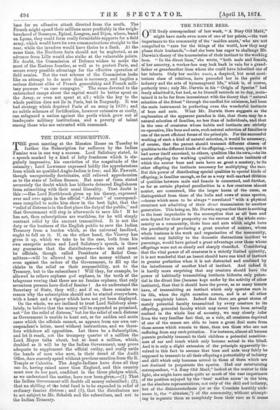THE INDIAN SUBSCRIPTION.
THE great meeting at the Mansion House on Tuesday to further the Subscription for sufferers by the Indian Famine was in one way a success. Lord Salisbury stated, in a speech marked by a kind of lofty frankness which is sin- gularly impressive, his conviction of the magnitude of the calamity ; Lord Lawrence expressed boldly the apprehensions from which no qualified Anglo-Indian is free; and Mr. Fawcett, though unexpectedly doctrinaire, still relieved apprehension as to the state of Indian finance. But none of them stated accurately the doubt which has hitherto deterred Englishmen from subscribing with their usual liberality. That doubt is this :—Has Lord Northbrook given up his theory, expressed over and over again in the official " Abstract " of correspond- ence compiled to make him show in the best light, that the "relief of distress is in the first place the duty of the public," and that Government will step in afterwards to save life ? If he has not, then subscriptions are worthless, for he will simply contract relief by the amount transmitted. It is not the duty or the business of the English public to save the Indian Treasury from a burden which, as the universal landlord, ought to fall on it. If, on the other hand, the Viceroy has given it up, which we take to be the case, both from his own energetic action and Lord Salisbury's speech, is there any guarantee that the distributors—who are and must be officials, though called Presidents of Relief Com- mittees—will be allowed to spend the money without or even against the orders of the Government, to fill up the chinks in the relief on their responsibility, not to the Treasury, but to the subscribers ? Will they, for example, be allowed to relieve orphans quci orphans, in the teeth of the telegrams vowing that there are no famine orphans, that only seventeen persons have died of famine ? As we understand the Secretary of State, they will ; and if so, there remains no reason why the subscription should not be started everywhere, with a heart and a vigour which have not yet been displayed.
On the whole, we are inclined to trust Lord Salisbury abso- lutely, to believe that the money will be expended as promised, not "for the relief of distress," but for the relief of such distress as Government is unable to hunt out, or for sudden and acute cases which the officials cannot, as appears from our own cor- respondent's letter, meet without instructions, and we there- fore withdraw all opposition. Let there be a Subscription, and let it reach, not the trumpery quarter of a million the Lord. Mayor talks about, but at least a million, which, doubled as it will be by the Indian Government, may prove adequate to supplement the official outlay, and really untie the hands of men who now, in their dread of the Audit Office, dare scarcely spend without previous sanction from Sir R. Temple or Calcutta. The Anglo-Indians have done all they can do, having raised more than England, and this country must now do her part, confident in the three pledges which, as we understand the matter, have now been given,—(1) That the Indian Government will double all money subscribed ; (2), that no shilling of tie total fund is to be expended in relief of ordinary famine distress ; and (3), that the distributors are to act subject to Mr. Schalch and the subscribers, and not to the Indian Treasury.


































 Previous page
Previous page